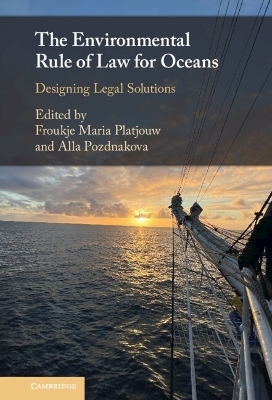
The Environmental Rule of Law for Oceans
Cambridge University Press (Verlag)
9781009253765 (ISBN)
Our oceans need a strong and effective environmental rule of law to protect them against increased pressures and demands, including climate change, pollution, fisheries, shipping and more. The environmental rule of law for oceans requires the existence of a set of rules and policies at multiple governance levels that appropriately regulate human activities at sea and ensure that pressures on the marine ecosystem are tackled effectively. Adhering to the rule of law through clear, predictable, coherent, and legitimate rules, and their implementation and enforcement, is timely and urgent. In this book, we are searching for ways to improve, strengthen and further develop the environmental rule of law for oceans. The book provides future-oriented perspectives on how law should evolve to better preserve the oceans. All chapters incorporate novel insights and ideas for legal solutions that might inspire scholars, actors, authorities, citizens and communities around the globe. This title is Open Access.
Froukje Maria Platjouw is a Researcher at the Norwegian Institute for Water Research, Oslo and at the Scandinavian Institute for Maritime Law, University of Oslo. She is an expert in EU and international law, specialized in environmental law, ocean law and ecosystem-based governance. Alla Pozdnakova is Professor of Law at the Scandinavian Institute for Maritime Law, University of Oslo. Her areas of research and teaching are public international law, law of the sea, outer space law, environmental law, Arctic, and EU/EEA law. She is a board member of the International Law Association, Norway, a member of the International Institute for Space Law and the expert committee for Norwegian space law.
Part I. Introduction: 1. The environmental rule of law of oceans Froukje Maria Platjouw and Alla Pozdnakova; Part II. Tackling Multiple Pressures on the Oceans: 2. Oceans and climate change: implications for UNCLOS and the UN Climate Regime Christina Voigt; 3. Controlling GHG emissions from shipping: the role, relevance and fitness for purpose of UNCLOS David Testa; 4. An international legal framework for marine plastics pollution: time for a change to regulate the lifecycle of plastics Dawoon Jung; 5. The 'Thin Law' of plastic regulation and a proposal for a regional or global waste tariff Anastasia Telesetsky; 6. Pollution of the Marine Environment by Spaceflights Alla Pozdnakova; Part III. Balancing the Exploitation and Preservation of Ocean Resources: 7. Restoration activities in the marine environment: balancing diverging perceptions of 'risk' Rozemarijn Roland Holst; 8. Marine geo-engineering to abate eutrophication in the Baltic Sea: how to address regulatory voids and uncertainty Brita Bohman and Henrik Ringbom; 9. Filling an iceberg-sized gap in the law of the sea: addressing an emerging demand on oceans Aref Shams; 10. The precautionary principle/approach and the United Nations Convention on the law of the sea-management of living resources Maurus Wollensak; 11. A regime lost at sea: critical reflections on the UNCLOS Conservation Regime and the Future of Marine Biodiversity Protection Pierre Cloutier de Repentigny; 12. Fisheries redistribution under climate change: rethinking the law to address the 'Governance Gap'? Mitchell Lennan; 13. Defining marine genetic resources – navigating through the sea of uncertainties Jakub Ciesielczuk; Part IV. Paths Towards Effective Ocean Governance, Implementation and Compliance: 14. Legitimacy and EU marine governance David Langlet; 15. Recognition of maritime environmental crimes within international law: a new global paradigm for the protection and preservation of the marine environment Vasco Becker-Weinberg;16. Mending the met: state responsibility for nationals engaged in IUU fishing? Pieter van Welzen; 17. The advisory jurisdiction of the ITLOS: from uncertainties to opportunities for ocean governance Carlos Cruz Carrillo; 18. Could the WTO save the oceans? An inquiry into the role of the WTO in the future of fisheries policies Leonila Guglya;19. Improving compliance with international fisheries law through litigation Solène Guggisberg; Part V. Strengthening the Rule of Law in Regional Seas and Oceans: 20. Regional cooperation for the conservation of marine biodiversity in the Eastern Tropical Pacific: a rule of law perspective Sarah Enright; 21. Oil pollution control regulations in the Baltic Sea – the effect of institutional interplay on implementation of the ecosystem approach Kirsi White; 22. The international law of the sea and arctic governance: paving the way to integrated ecosystem-based marine management Andrey Todorov; 23. Understanding Japan's resumption of commercial whaling under international law Constantinos Yiallourides; 24. Failing rule of law: the case of the South China Sea Agnes Chong; Part VI. Concluding Remarks: 25. Legal solutions for oceans in change: mapping out the way forward Froukje Maria Platjouw and Alla Pozdnakova.
| Erscheinungsdatum | 03.04.2023 |
|---|---|
| Zusatzinfo | Worked examples or Exercises |
| Verlagsort | Cambridge |
| Sprache | englisch |
| Maße | 152 x 229 mm |
| Gewicht | 781 g |
| Themenwelt | Recht / Steuern ► EU / Internationales Recht |
| Recht / Steuern ► Öffentliches Recht ► Umweltrecht | |
| Wirtschaft ► Volkswirtschaftslehre | |
| ISBN-13 | 9781009253765 / 9781009253765 |
| Zustand | Neuware |
| Informationen gemäß Produktsicherheitsverordnung (GPSR) | |
| Haben Sie eine Frage zum Produkt? |
aus dem Bereich


